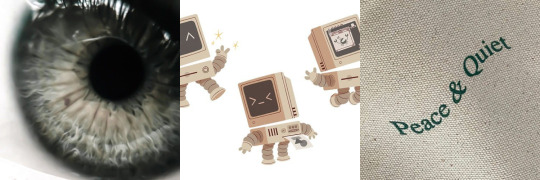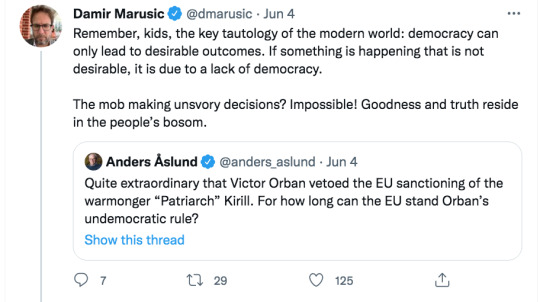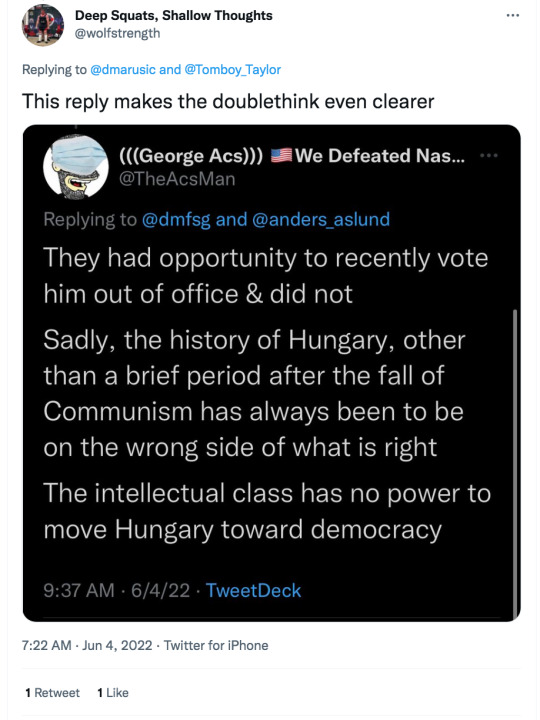#marusou
Text






🫂 tem coisa boa no meio
#icons#lq#lq icons#layouts#lq layouts#colored icons#tomie kawakami#tomie#tomie icons#tomie tomie#tomie layouts#manga#marusou icons#marusou#miss kikuchi#marusou layouts#junji ito
203 notes
·
View notes
Text
Mi sa Di Bello settimana prossima arbitra la lega pro
3 notes
·
View notes
Text
“Watching events unfold this weekend in Israel, I thought back to a feeling that I first felt more than two months ahead of Russia launching its war in Ukraine. That same sense of dread is, if nothing, more firmly entrenched in my chest today. The feeling is still nebulous. It’s as if we are all watching a catastrophic car crash and simply don’t have the vocabulary to describe it.
(…)
“Autocracy versus democracy” does not usefully describe the moment. It feels like a discarded line from some kind of late-night brainstorming session. Its purpose was ostensibly to organize thinking — to name a threat and to allow for collective action. In the cold light of day, it reads like self-regard.
(…)
But many woke up on Saturday to the palpable fear of a real threat. Towns and small cities overrun by well-organized militia. Scores of civilians shot dead. Hostages abducted. As I write this on Monday night, the IDF is still fighting battles in Israeli population centers. Soon enough, it will be waging a Stalingrad-like fight in Gaza, doling out horrific human costs in pursuit of retribution. And that’s if no other nasty surprises are looming. The prevailing consensus is that 9/11 is the correct historical parallel for Israel. If Hezbollah enters the fight in the coming days, the 1973 Yom Kippur War will be a more apt comparison.
(…)
No, it’s not about democracy versus autocracy. The wheels are coming off. Our predecessors bequeathed to us a period of unprecedented tranquility. They were not infinitely wise in getting us here — no wiser than we are. But we grew up used to it in ways they could never imagine. We assumed order was normality, that peace was what naturally arose when power-hungry hyperpowers minded their own business. A better and more just world was there for the taking, if only we were moral enough to push for it.
The overarching metaphor in one of Robert Kagan’s recent books is fundamentally correct: order is a garden to be tended, but the jungle is the norm. I still hold that his moralistic “authoritarianism versus democracy” paradigm is misguided. Morality has nothing to do with it. Pessimism about progress — a conviction that nothing is permanent — is a far better guide.
My friend and former colleague Walter Russell Mead penned a prescient column earlier this year. He put his finger on the failings of the Biden administration’s fundamentally optimistic worldview. He pointed out that China, Russia and Iran are eating away at the existing order.
From the outset, the administration knew that the American-led world system was in trouble, but it underestimated the severity of the threat and misunderstood its causes . . . Two years later, the Biden administration is struggling to manage the failure of its original design . . . Russia isn’t parked, Iran isn’t pacified, and the three revisionists are coordinating their strategy and messaging to an unprecedented degree.
The Biden folks really are the third Obama administration. They fundamentally believe that the moral arc of the universe bends towards justice. At the limit, they see our primary task is to make sure we don’t stand in the way.
It’s time to abandon those good feelings. Our holiday from history is over. Or at least it needs to be over.
The Wall Street Journal ran a strong editorial today calling on the United States to get on a solid war footing. I’ve made a similar case for months now. Given how the Ukraine War has progressed, I’ve argued that President Biden needs to stand in front of the nation and tell the American people that the free lunch is over. We can no longer enjoy the massive “peace dividend” we reaped in 1991. It’s time to embrace that the world is dangerous and unforgiving. Prepare for the storms that are coming.
(…)
The Europeans were perhaps rattled in the first weeks of the war, when everyone thought Kyiv would fall in a fortnight. Even German Chancellor Olaf Scholz was saying how German thinking about security was undergoing an epochal transformation. That didn’t last. And even reports that Russia is by some measures now militarily outproducing both the United States and Europe combined hasn’t altered the mood.
Make no mistake, this isn’t just European decadence. We here in the United States are no less complacent. We talk about shared values and how we must support the Ukrainians until the end. But (not-so) secretly, we are glad that they are dying instead of us. Apart from a handful of military veterans and foolhardy enthusiasts, there are a vanishingly few people putting their lives on the line for a common moral cause. Though we say this is our fight, it’s really not.
Why? We come full circle. “Democracy” is not a real cause, “autocracy” is not a real threat. Or, to put it more carefully, that binary does not resonate today in ways that would have you put your life on the line. Not in the way it did during the Cold War, anyway. Safe peaceful street protests against domestic despots-in-waiting? Sign me up. I’d love to re-enact 1989. But as a unifying narrative with real stakes? It’s misaligned. It misidentifies the problem in some non-trivial way. Everyone feels that disconnect, and shrugs when it is invoked. This is not an assertion, just an empirical observation.
But something is happening. I feel it. I think many others feel it. The jungle is growing back. And we naive civilized folks, we couldn’t even start a fire without matches, much less feed or defend ourselves in the wilderness.”
“The larger context is that the U.S. and its allies now face two regional wars provoked by rogue states that are increasingly aligned. Israel and Ukraine are on the front lines, but the risk of an expanded conflict is real. Iran is feeding weapons into Vladimir Putin’s invasion in Ukraine. Mr. Putin is a junior partner of the Chinese Communist Party, which could try to exploit the moment in the Pacific.
The strategic and political point is that the return of war against Israel isn’t an isolated event. It’s the latest installment in the unraveling of global order as American political will and military primacy are called into question.
The President now has an obligation to increase the defense budget and stop treating the U.S. military as a political wedge to feed the American welfare state. For three years Mr. Biden has proposed cuts in defense spending after inflation, even as the world has become more dangerous.
The President can stop the budget games—the demands that every dollar on U.S. forces be matched with another for solar panels or food stamps—and work with Republicans to rebuild U.S. military power. That package should include aid for Israel, Ukraine and Taiwan. It should feature a generational effort to expand U.S. munitions inventories, from 155mm artillery to sophisticated long-range antiship missiles. Ditto for a plan to build more U.S. attack submarines for the Pacific.
Already officials are leaking that the U.S. may struggle to supply both Israel and Ukraine with artillery or other weapons while also deterring China. But America can either meet the moment or regret it later when the world’s rogues attack other allies, or U.S. forces deployed abroad, or even the homeland.
(…)
As for Republicans in Congress, they will have to get serious about governing and elect a new Speaker with dispatch. They need to isolate the Steve Bannon acolytes who treat shutting down the government for no good reason like a personal power play. Americans may be among Hamas’s hostages, and the GOP should support Mr. Biden if he sends a military mission to rescue them. The world needs to see that the U.S. can unite in a common security purpose.
(…)
The growing global disorder is a result in part of American retreat, not least Mr. Biden’s departure from Afghanistan that told the world’s rogues the U.S. was preoccupied with its internal divisions. But too many Republicans are also falling for the siren song of isolationism and floating a defense cut in the name of fiscal restraint. The Hamas invasion should blow up dreams the U.S. can “focus on China” and write off other parts of the world.
Donald Trump didn’t rebuild U.S. defenses as much as he claims, and his political competitors should say so. Former Vice President Mike Pence was correct when he said over the weekend that the awful scenes abroad are what happens when political leaders are “signaling retreat from America’s role as leader of the free world.” Nikki Haley sounded similar notes.
They seem to know what time it is. The rest of Washington needs an alarm clock.”
“Exactly 37 years ago, on a bleak outlook overlooking the Atlantic, the two remaining Cold Warriors met in Reykjavik and proposed the almost unthinkable — to rid the world of all nuclear weapons.
Ronald Reagan and Mikhail Gorbachev began a dialogue that set in motion a series of summits that would ultimately not achieve this bold objective but resulted in what many historians cite as the beginning of the end of the Cold War.
However, the question remains: to what end?
While the Cold War came to a close, the threat of nuclear war did not. The global nuclear arsenal had reached its peak in 1986 with over 63,000 weapons in circulation compared to 12,500 today, according to the Federation of American Scientists.
But the number of missiles is immaterial, as today’s weaponry is five times more lethal than Big Boy and Fat Man — the two bombs dropped on Japan at the end of WWII.
In addition, the range and mobility of the current arsenal have expanded significantly with the ability to reach any destination — from London to Moscow to Washington — in a matter of minutes, wiping out millions of people instantaneously.
(…)
The subsequent arms race that ensued between America and the Soviet Union led to the doctrine of Mutual Assured Destruction, or MAD, that served to handcuff both sides with the premise that “if you fire on me, I’ll fire on you.”
A flawed concept to be sure. Yet the MAD strategy (which it truly is) remains the primary nuclear conflict deterrent today.
Adding to this MADness is the nonchalant manner that a large part of the world has adopted toward the threat of a nuclear conflict.
The possibility has shifted to the back of our collective psyches allowing us to focus on more important issues crowding our agenda.
A case in point is the most recent Republican presidential debate. While there were several questions around Taiwan and Ukraine, there was no specific reference to the “what if” of a nuclear engagement.
(…)
As a child of the Cold War, I can still remember the air raid drills in my community and hiding under my school desk.
That clear and present danger had lurked over the civilised world’s head but has since dissipated into the ether.
One would hope bright minds in political capitals around the world are gaming how to avoid a nuclear conflict.
But that notion calls to mind a moment when President Reagan after being briefed on the concept of Mutual Assured Destruction posed the simplest of questions, “What is Plan B?” to which his advisors had no answer.
And today as we celebrate their famous meeting in Iceland almost four decades later it is time again to ask our leaders — “What is plan B?””
2 notes
·
View notes
Text




Stan Marusou for being one of the only junji ito protags logical and sane enough to try and escape/run away instead of staying around to find out for herself
#black paradox#junji ito#stan marusou#its a shame that she kept on getting dragged into these messes in the first place#we need more horror media protags like this
6 notes
·
View notes
Text

Klara Mucci by © Duško Marušić
0 notes
Video
youtube
Во Казани мой милёнок Марусéньку. Агафонова. Tradition. Folklore. परंपरा...
#youtube#Во Казани мой милёнок Марусéньку перенёс. Агафонова (Чазова) Тамара. Шевченково. Бахчисарай. Крым. 28 декабря 2022г. In Kazan my dear Maruse
0 notes
Photo


(link)
#twitter#screenshots#damir marusic#anders åslund#hungary#democracy#its undemocratic for the wrong candidate to win elections
1 note
·
View note
Text

Marusal
A piscivore "fangded" noasaur found in woodlands of LoLT. They have two tactics of feeding: one is wading near rivers , catching anything which can't fight back or escape in time; second is swimming at the surface and occasionally diving for short time when prey is close enough. Webbed feet and paddle like tail make them quite good at swimming , however marusals are very poor divers. Except for fish marusals can eat invertebrates , small terrestrial and flying tetrapods. Striking eye-like pattern on tail confuses predators by making them think it is the head.
3 notes
·
View notes
Text
Shoutout to Junji Ito aesthetic board people having not even read anything by Junji Ito aside from Uzumaki and Tomie
Just saw a Tomie aesthetic post and the first image on it was a picture of Marusou from Black Paradox.
#I've also seen a Tomie aesthetic board with the illustration of Kirie with curled up hair#I totally get finding the artstyle darkly beautiful#but it completely frustrates me that these people only read the most popular stuff#and the lack of effort to even try (these boards use the same five or six images every time i swear
2 notes
·
View notes
Text
Writing Prompt: Finding a Narrative
Yet in recent decades, the United States has begun to experience a precipitous collapse in trust in public institutions. Trump himself has accelerated this collapse among more conservative Americans, and much of his party now contributes to it, too. That means that the foundations of the rule of law have already been seriously undermined....
...This is a dangerous problem, because it shows both that the rule of law is already in an advanced state of decay and that pressing charges against Trump, putting him on trial, and potentially throwing him in jail will accelerate this process, making the decay far worse—because each of those acts undertaken against Trump will confirm the right in its conviction that “the rule of law” has already been replaced by rank partisanship.
-Damon Linker
Trump is a symptom of a weakened democracy, but not the cause.
Why is Donald Trump so powerful? How did he come to dominate one of the two major parties and get himself elected president? Is it his hair? His waistline? No, it’s his narratives. Trump tells powerful stories that ring true to tens of millions of Americans.
The main one is that America is being ruined by corrupt coastal elites. According to this narrative, there is an interlocking network of highly educated Americans who make up what the Trumpians have come to call the Regime: Washington power players, liberal media, big foundations, elite universities, woke corporations. These people are corrupt, condescending and immoral and are looking out only for themselves. They are out to get Trump because Trump is the person who stands up to them. They are not only out to get Trump; they are out to get you.
This narrative has a core of truth to it. Highly educated metropolitan elites have become something of a self-enclosed Brahmin class. But the Trumpian propaganda turns what is an unfortunate social chasm into venomous conspiracy theory. It simply assumes, against a lot of evidence, that the leading institutions of society are inherently corrupt, malevolent and partisan and are acting in bad faith.
-David Brooks
This dynamic started to mutate in the middle of the 20th century. Though surveys from the 1950s through the 1980s saw a marked decline in sectarian hatreds in the United States, the period saw the emergence of a conflict that is familiar to us today: a fight over “ultimate moral authority,” pitting those with orthodox tendencies (people committed to “an external, definable, and transcendent authority”) and those with progressivist leanings (people who are generally committed to deriving authority from rationalism and subjectivism).
“Abortion, child care, funding for the arts, affirmative action and quotas, gay rights, values in public education, or multiculturalism” — all these debates, Hunter notes, derive from this struggle for moral authority. Jews, Catholics, Protestants, and Muslims these days spend less time in doctrinal disputes with each other and instead each split along the orthodox/progressivist divide. It’s not shocking, for example, to see some Orthodox Jews aligning with Catholics and evangelicals against abortion.
Hunter’s analysis was groundbreaking in that it highlighted the religious underpinnings that tied these fights together. But his argument wasn’t that the culture wars were simply a fight between the forces of traditionalism versus the forces of secularism. Rather, his point was that everything in America was suffused with a religious sense of mission — even spheres we might normally imagine are completely secularized.
-Damir Marusic
The situation as Buchanan sketched it out is a dangerous one for a liberal democracy like ours. If the fight is over values rather than policy positions — a “religious war” — compromise is impossible: Values are absolute and not amenable to deliberative give-and-take.
And democratic elections are not meant to adjudicate such matters anyway. They are by definition a mechanism of temporarily designating who gets to run the country. (The question is posed to voters again and again, on a regular schedule.) If the issues at stake are about the very “soul of America,” democracy quickly reveals itself to be a profoundly unsatisfying means of organizing our politics.
It’s that lack of satisfaction with democratic outcomes that undeniably played a role in Republicans pursuing a legalistic means of undermining the legitimacy of Clinton’s presidency. The dark murmurs about the legitimacy of Bush and Obama didn’t rise to the level of what happened under Clinton, but now, with Trump, we’re back to special prosecutors and talk of impeachment...
...Pat Buchanan’s call to arms in 1991 was a pivotal moment in American politics. Buchanan saw himself and his followers as the ones on the defensive in a struggle that had been going on for a while. He had probably read Hunter’s book (which was published earlier that year), and it may have crystallized some things for him. The struggle itself wasn’t necessarily new, but calling it a “religious war” in an explicitly political context almost certainly changed things.Hunter’s orthodox and progressivists had already mostly sorted themselves into the two major parties by that point. Buchanan was the bugler sounding the cavalry charge. Buchanan’s bugling didn’t cause an immediate rupture in society. But by injecting “ultimate,” zero-sum questions into democratic politics, he undoubtedly put a new process into motion.Trust is a fragile thing, the first casualty of any war. And given that this war is now in its 27th year, it shouldn’t be surprising that reservoirs of trust — especially in partisan politics — are at an all-time low. But while Trump himself seems to go out of his way to exacerbate tensions among Americans, it’s important to remember that he is ultimately the symptom of something that has been going on for quite some time. And that implies that with his departure, we will not necessarily be better as a country.
-Damir Marusic
Third, we’ve come to dominate left-wing parties around the world that were formerly vehicles for the working class. We’ve pulled these parties further left on cultural issues (prizing cosmopolitanism and questions of identity) while watering down or reversing traditional Democratic positions on trade and unions. As creative-class people enter left-leaning parties, working-class people tend to leave. Around 1990, nearly a third of Labour members of the British Parliament were from working-class backgrounds; from 2010 to 2015, the proportion wasn’t even one in 10. In 2016, Hillary Clinton won the 50 most-educated counties in America by an average of 26 points — while losing the 50 least-educated counties by an average of 31 points.
These partisan differences overlay economic differences. In 2020, Joe Biden won just 500 or so counties — but together they account for 71 percent of American economic activity, according to the Brookings Institution. Donald Trump won more than 2,500 counties that together generate only 29 percent of that activity. An analysis by Brookings and The Wall Street Journal found that just 13 years ago, Democratic and Republican areas were at near parity on prosperity and income measures. Now they are divergent and getting more so. If Republicans and Democrats talk as though they are living in different realities, it’s because they are.
-David Brooks
I want to write an essay about the moment that we are in which is the result of many factors. We are dealing with eroding trust in institutions, a growing class divide and all of this leads to a wannabe authoritarian that is turning one political party into his personality cult. The above quotes and links are the backbone of the essay.More to follow soon.
2 notes
·
View notes
Text
ancient greek names
Abnoble Adelion Adria Aegesto Aerakon Aeraligus Affectiona Afrumful Agammemna Agath Aggres Agness Aileia Aileitos Aileme Ajanus Alame Alandra Alector Alemontron Aleris Aless Aleto Alexant Alexanthus Alexantius Alsius Anaxago Andinis Andready Androse Angered Angis Ankourgos Antevort Anthias Antia Apizzi Aponorba Aponus Appinna Aqual Ardea Ardia Armer Arnemena Arvera Ascender Augus Aurolia Avensta Balanes Balaudia Banna Baris Basilistos Belaina Berer Bevagnia Bluentia Bovius Brigenike Brigenna Bubonia Buxene Buxeno Calianos Callis Camer Camna Camucifer Camucium Canax Capis Carduinnes Caromarken Caustia Ceanona Celanus Cerea Cered Chaemium Charmenrva Charona Charos Chastaira Chiercula Chlory Cimaios Cletia Cloacitas Cloacitus Clotall Colonia Comiki Commonia Concas Conda Convecta Copiacchus Cordian Coveras Cunni Curydike Cymon Cymontum Daeda Damarkissa Damous Delagios Despoinos Diantus Discorus Domiki Dubrigant Durolican Durovia Earta Ebona Echoir Elagios Elenike Eless Elessorsa Elpid Elpomena Emped Entucadria Eraetonnus Erius Euadelaina Euadeon Euadeona Euphros Eutha Eutropiae Fabulina Fabus Famon Famonia Famountair Fearth Febrina Felica Fidens Fires Flamer Flamium Flampeia Flatina Flator Florina Floris Floritian Follo Fontia Fontronium Fotikosmos Fotionas Freedorus Froseidoul Furit Gales Galla Garicus Garriantum Garrior Gazellae Genia Glyceri Glycernus Glycerros Glykeris Glykou Godden Goldens Goritas Graclium Graton Gregillae Guardacaa Haidra Harias Haritasgus Heartas Heclata Hekated Helenia Helpertios Helpidamon Hephonos Herakon Heralas Heramna Herapon Herastaira Herminus Hesis Hilemonia Hispes Hittium Homerius Horos Horsa Hunta Hygin Hyginoton Hypatilla Hypation Hypatis Imatha Indinia Indorumful Indros Intha Intherator Iovardian Isiphone Joanna Jovide Joyfulvii Jupienua Jutum Juturnus Kadmost Kadmus Karion Kephaiden Kephemis Kephocas Kleithras Krona Lacho Lavertum Ledge Lefthe Lenina Leoplean Liberaea Libered Libereus Licus Ligeniacaa Lonas Lonnes Luxovia Lykerian Lysses Mached Maejan Maidentium Majoritas Mapon Marcaes Marcial Marknessa Maruse Medipus Meficinxia Melica Melicitas Melione Melix Melpis Menea Metha Metia Metra Milian Minus Mitia Moung Mutis Myros Myrroras Mytie Navenna Neces Nemaustus Neptimaios Nerodos Nikephos Nomina Noria Oceal Olian Olytie Orcia Ordian Oriae Oulis Ouranio Padros Paleria Pallios Pallisaac Pandrea Paraclius Parthy Peares Peduma Peopheus Persong Pertal Pertios Petroning Phain Phylus Piacernus Pienus Polle Pollo Pollum Polybright Potection Princinis Prior Psychesis Ptolene Pyros Quilomer Quiriplina Remestus Ressis Rheaveta Rhodion Rhodis Ricus Robius Roborvo Robus Roman Roxandro Rudge Rulancas Ruless Rumful Rutupit Saepiness Saepius Salia Saliasona Sarian Scial Sciplina Secuba Securia Secury Segon Semonius Sendove Sentus Servanuel Severis Severnund Severnus Shinis Shinium Shouta Shris Silippos Smemberate Solumnovis Sotikos Sotine Sountua Spyria Spyrrorsa Stain Stameria Stimintain Stitus Stranis Strater Strenea Suadne Subrae Sucetum Sulis Summanos Tacina Tacious Tamer Taormion Tedoul Temnone Terius Terna Ternus Terros Thalkyone Thecurias Themiltia Theni Thenoa Theodos Thermenea Tidius Timiant Titum Touta Tranos Trene Trenus Trina Trinum Trinus Tryphales Tryphasta Turnus Valexanthe Vasilike Veless Ventia Ventina Versian Vetellong Vetra Vheter Vheterium Victor Vindite Virota Virotentum Virth Visucerium Vitia Vitus Volum Vulcarneme Wandros Warrios Wides Windinia Windra Winger Xanthena Yanextios Zacharme Zachon Zachoros Zoeace Zosio Zotina
#name stash#444names#444 names#dnd names#character names#markov namegen#markov name generation#markov#markov gen
2 notes
·
View notes
Text
Corsport - Lazio, previsti dei cambi
Su Corsport, spazio alla Lazio, sulle fasce Hysaj a destra e Marusic a sinistra,: sono i due utilizzati dal momento del cambio forzato a Genova.source
View On WordPress
0 notes



